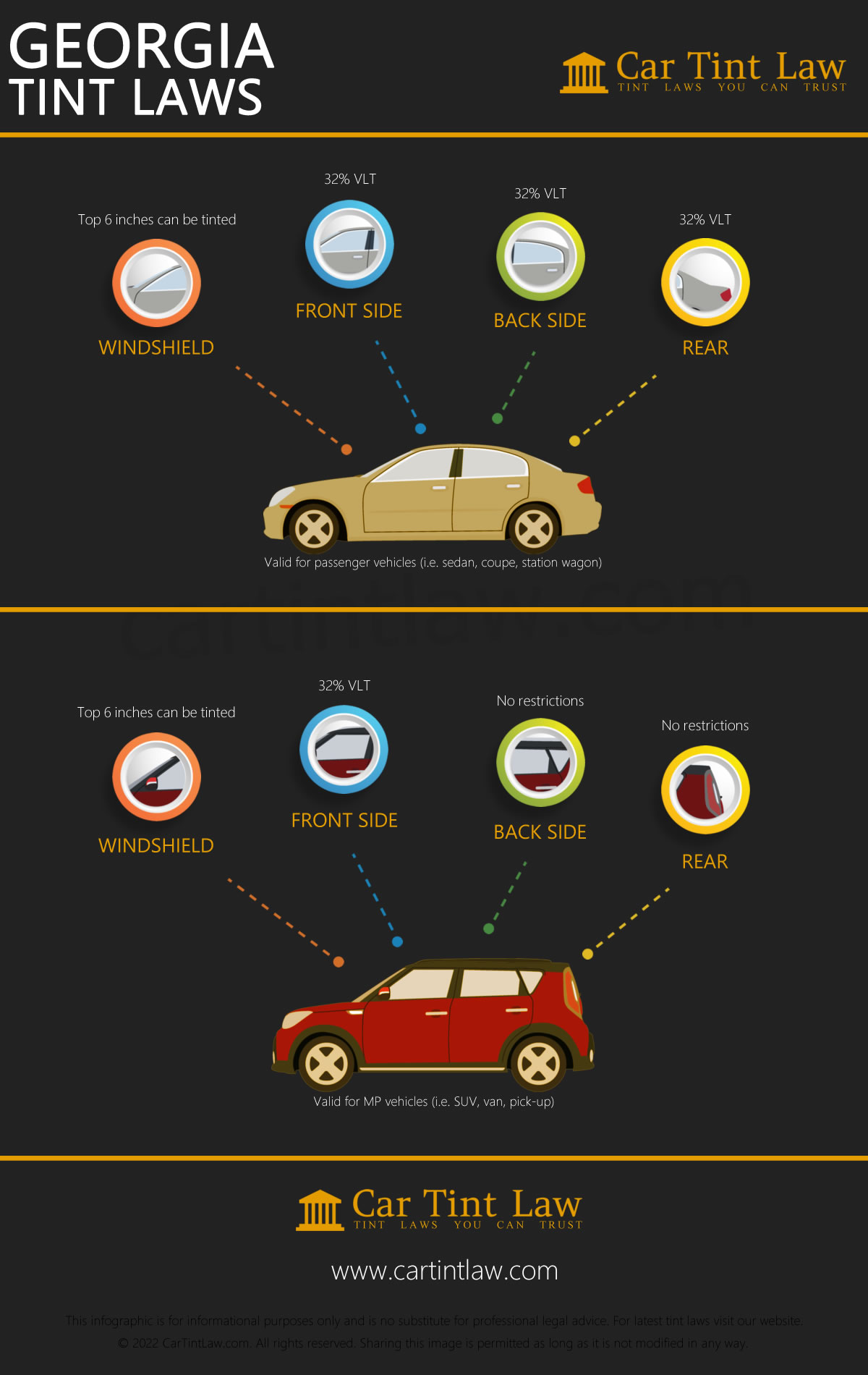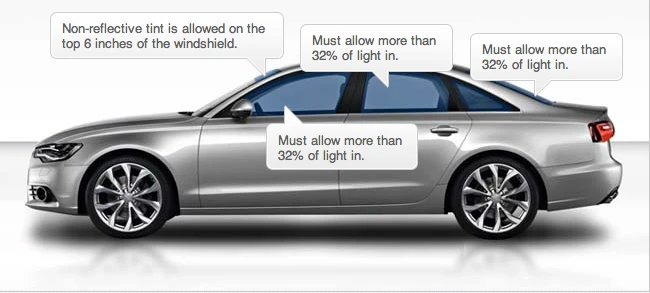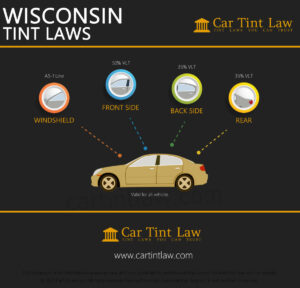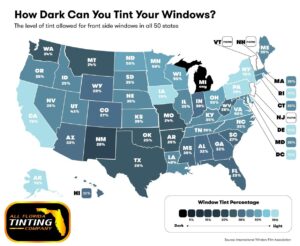As an Amazon Associate, I earn from qualifying purchases
Driving in Georgia? Car tint laws can be confusing.
Knowing the rules is key. Understanding Georgia’s car tint laws ensures you stay compliant and avoid fines. These laws dictate how dark or reflective your car windows can be. They aim to balance driver comfort and safety. This blog will break down the specifics of Georgia’s car tint regulations.
We’ll cover what is allowed and what is not. Whether you already have tinted windows or plan to get them, this guide will help you. Stay informed and drive with confidence in Georgia. Let’s dive into the details of these laws so you’re prepared and well-informed.

Credit: walkercountyga.gov
Legal Tint Limits
Understanding Georgia’s car tint laws is essential for every driver in the state. Legal tint limits ensure safety and visibility for all. These regulations are in place to balance aesthetics and functionality. Let’s dive into the legal tint limits for different windows on your vehicle.
Front Windows Regulations
Georgia law mandates that front-side windows must allow more than 32% of light in. This means your tint should not block more than 68% of light. This rule ensures that drivers have clear visibility during the day and night. It’s a safety measure for both drivers and pedestrians.
Rear Windows Regulations
For rear windows, the rules are more relaxed. You can have any level of tint darkness. This allows for greater privacy and protection from the sun. However, make sure your rearview mirror provides clear visibility. Remember, safety should always come first.
Medical Exemptions
Georgia car tint laws are strict. But did you know there are medical exemptions? People with certain medical conditions may qualify. This allows them to have darker tints on their vehicle windows. Let’s explore the eligibility criteria and application process for these exemptions.
Eligibility Criteria
Not everyone qualifies for a medical exemption. You must have a medical condition that requires special protection from the sun. Conditions like lupus, photosensitivity, or skin cancer are examples. A licensed physician must diagnose you. The diagnosis must be documented in writing.
Application Process
The application process is straightforward. First, get a written statement from your doctor. The statement must explain your medical condition. It should also mention why you need darker window tints.
Next, you need to fill out the application form. This form is available on the Georgia Department of Public Safety website. Include your doctor’s statement and submit the form. There may be a small fee for processing.
Once approved, you will receive a medical exemption certificate. Keep this certificate in your car. You may need to show it to law enforcement if questioned about your window tint.
Penalties For Non-compliance
Georgia’s car tint laws are strict. Drivers must follow these rules. If they don’t, they face penalties. Understanding these penalties helps avoid trouble.
Fines And Fees
Drivers with illegal tint face fines. The first offense usually costs $25. Repeat offenses can cost more. The amount can increase up to $100. Paying fines can add up quickly. This makes a legal tint a smart choice.
Potential Legal Consequences
Breaking tint laws can lead to legal trouble. Police can stop your car. They may give you a ticket. You may need to appear in court. Judges can impose extra penalties. This can include community service or probation. It’s best to avoid these issues. Follow Georgia’s tint laws to stay safe.

Credit: www.cartintlaw.com
Benefits Of Window Tinting
Window tinting offers a range of benefits for car owners. It enhances privacy, protects the interior, and improves comfort. Understanding these benefits can help you make an informed decision about tinting your car windows.
Heat Reduction
Window tinting significantly reduces the heat inside your car. It blocks a large percentage of solar energy, keeping your car cooler. This can be a lifesaver during hot summer months. It also reduces the need for air conditioning, which can save fuel.
Imagine sitting in a car that feels like an oven. Tinted windows can prevent this. They reduce the heat, making your ride more comfortable. This is especially useful in states like Georgia, where summers can be sweltering.
Uv Protection
Car window tinting protects against harmful UV rays. These rays can cause skin cancer and other health issues. Tinted windows block up to 99% of UV rays, safeguarding you and your passengers.
UV rays can also damage your car’s interior. They fade upholstery, crack dashboards, and weaken materials. Tinted windows protect your car’s interior, helping it look new for longer. This can maintain your car’s value over time.
Choosing The Right Tint
Choosing the right tint for your car windows is crucial. The right tint can enhance your car’s look and provide privacy and protection. Understanding the types of tint and factors to consider can help you make the best decision.
Types Of Tint
There are different types of window tints available. Each type offers unique benefits.
- Dyed Tint: This is a popular and cost-effective option. It adds a layer of dye between the adhesive and protective polyester top coating. It provides a dark appearance and reduces glare.
- Metalized Tint: This type includes small metallic particles. It strengthens the window and reflects heat. It also provides a shiny appearance.
- Carbon Tint: Carbon tint is great for blocking UV rays. It does not fade over time. It gives windows a matte finish.
- Ceramic Tint: The most advanced type. Ceramic tint blocks UV rays and reduces glare. It does not interfere with electronic signals.
Factors To Consider
Several factors can influence your choice of tint.
- Legal Restrictions: Check Georgia car tint laws. Different states have different regulations.
- Purpose: Think about why you want a tint. Is it for privacy, UV protection, or heat reduction?
- Budget: Different types of tint vary in cost. Choose one that fits your budget.
- Durability: Consider how long the tint will last. Some types are more durable than others.
Selecting the right tint for your car windows involves understanding the various types and considering key factors. This ensures you comply with Georgia car tint laws and meet your needs.
Installation Guidelines
Installing window tint on your car in Georgia can enhance privacy, reduce glare, and protect interiors. Following proper installation guidelines is crucial to ensure compliance with Georgia’s car tint laws. This section covers essential tips and considerations for both professional and DIY installations, along with maintenance advice.
Professional Vs. Diy
Choosing between professional installation and DIY comes down to skill, time, and budget. Here are the pros and cons of each:
| Professional Installation | DIY Installation |
|---|---|
|
|
Maintenance Tips
Proper maintenance extends the life of your car tint and keeps it looking fresh. Follow these tips:
- Wait Before Cleaning: Let the tint cure for a few days.
- Use Soft Cloths: Avoid abrasive materials.
- Avoid Ammonia: Use ammonia-free cleaners to prevent damage.
- Check for Bubbles: Address any bubbles promptly to avoid peeling.
With proper care, your car tint can last for years while staying within Georgia’s legal limits.

Credit: thetintguy.com
Frequently Asked Questions
What Are The Legal Tint Limits In Georgia?
In Georgia, front-side windows must allow more than 32% of light in. Rear windows can be darker.
Can I Have A Medical Exemption For Darker Tint In Georgia?
Yes, Georgia law allows medical exemptions for darker tint. A state-issued permit is required.
Are There Penalties For Illegal Window Tint In Georgia?
Yes, illegal tint can result in fines and require removal. Penalties vary by county.
Does Georgia Tint Law Apply To All Vehicles?
Yes, Georgia tint laws apply to all cars, trucks, and SUVs. Specific regulations may vary slightly.
Conclusion
Understanding Georgia car tint laws is crucial for every driver. Compliance ensures safety and avoids fines. Keep your vehicle within legal limits. This helps maintain clear visibility and reduces glare. Regular checks on your tint’s condition are important. Always stay informed about any changes in these regulations.
Following these laws not only keeps you legal but also safer. Remember, informed driving is responsible driving. Stay safe on the road with proper car tinting.
As an Amazon Associate, I earn from qualifying purchases


